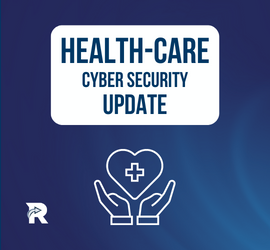
Healthcare as a sector when it comes to cyber security suffers some of the most damage when cyber-attacks occur. Due to the volume of data, the scale of cyber-attacks is large in the healthcare industry. Since there is so much data contained in the health sector, more cyber criminals are targeting healthcare organizations.
“According to a recent survey, more than one in three healthcare organizations around the world reported being hit by ransomware in 2020: and there is little indication of any slowdown. One study conducted in 2021 found that attacks against health plans rose nearly 35% from 2020 to 2021. Furthermore, there was a rise from 14 million total victims of healthcare attacks in 2018 to 45 million in 2021.” (Security Magazine).
HCA Healthcare recently suffered a major data breach affecting 11 million patients (about twice the population of Arizona). The organization is “a leading healthcare organization comprised of 180 hospitals and 2,300 ambulatory sites of care in 20 states and the United Kingdom.” (Health IT Security).
With attacks such as these becoming more and more prominent, it is the responsibility of healthcare organizations to implement proper precautions and procedures for cyber security as the data of millions of patients depends on it. Here are some current threats against healthcare organizations and strategies to prevent them and address them.
Threats:
DDoS Attacks:
Distributed Denial of Service attacks against the healthcare sector can be deadly. The name of the cyber-attack describes the idea behind it: deny people the service they’re looking for. A flood of internet traffic keeps systems from being able to operate. “A 2022 study found that the most common ramifications of cyberattacks are delayed procedures and tests. 57 percent of surveyed providers reported negative patient outcomes; 50% reported increased complications from medical procedures.” (Security Magazine). This means that cyber-attacks can have effects on patients' physical health.
Ransomware:
Ransomware is malicious software that takes your data for ransom. For healthcare, this is detrimental as records are essential and integral to the operation of hospitals and offices. “According to a report by IBM Security, the average healthcare breach now costs $10.1 million, usually attributed to losses induced by system shutdowns.” (Security Magazine). There is a physical risk for patients as well as a digital risk as their data becomes available for exploitation by cyber criminals.
Phishing:
Phishing is the most common technique cyber criminals use in the healthcare sector. Constant communication is occurring; therefore, a healthcare worker is the perfect target for a cybercriminal. An email or a text message containing a malicious link or attachment could cause a major data breach.
Strategies:
Cyber Hygiene:
Since phishing is common in the healthcare sector, cyber hygiene is becoming increasingly important for healthcare workers the more technology is implemented into healthcare. Cyber hygiene is the proper navigation of the cyber world. The big idea is to avoid downloading malicious software by being careful and aware of the risks. Don’t click on unknown links or download unknown attachments. Implement training procedures for employees on cyber hygiene.
Keep Software Up to Date:
Keeping software up to date will allow for security measures to be automatically downloaded onto devices. “A study conducted in 2020 found that 83% of hospital infrastructure is running on outdated software, largely attributable to the now unsupported Windows 7 operating systems.” (Security Magazine). By keeping software up to date in the healthcare industry, many cyberattacks can be avoided.
Security Services:
Finally, receiving assistance from professionals on cyber security procedures will increase the success of cyber security measures in the healthcare sector. “Adopting modern IT infrastructure is increasingly important as cyberattacks and malware become more frequent and sophisticated. If critical software updates and cybersecurity education continue to be deprioritized, healthcare providers are at risk of reducing the quality of care and patients losing trust in the healthcare industry.” (Security Magazine). Don’t lose the trust of your patients and receive the proper help in cyber security.
Responsive Technology Partners is the leading cyber-security expert in the Athens, Metter, Milledgeville, Vidalia, and Atlanta, Georgia areas. We also have locations in Tampa, Florida, Roanoke, Virginia, Raleigh, North Carolina and San Antonio, Texas. Service offerings include I.T. support, cyber-security and compliance, cloud-based POS systems and support, telephony, cloud services, cabling, access control, and camera systems. Our company’s mission is to provide world-class customer service through industry leading I.T. solutions that make every customer feel as if they are our only customer. Please visit our website to learn more: https://www.responsivetechnologypartners.com/.
Sources:
Health IT Security. https://healthitsecurity.com/news/hca-healthcare-suffers-data-breach
Security Magazine. https://www.securitymagazine.com/articles/98755-the-outlook-for-healthcare-cybersecurity-in-2023




